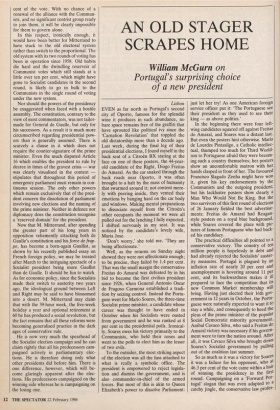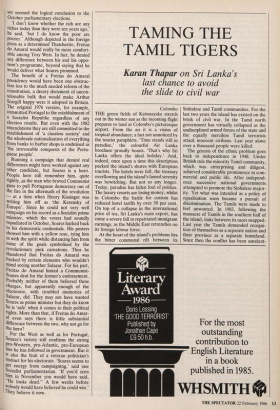AN OLD STAGER SCRAPES HOME
William McGurn on Portugal's surprising choice of a new president
Lisbon EVEN as far north as Portugal's second city of Oporto, famous for the splendid wine it produces in such abundance, no bare space remains free of the graffiti that have sprouted like political ivy since the `Carnation Revolution' that toppled the old dictatorship more than a decade ago. Last week, during the final leg of their presidential elections, I found myself in the back seat of a Citroen BX staring at the face on one of these posters, the 44-year- old candidate of the Right, Diogo Freitas do Amaral. As the car snaked through the back roads near Oporto, it was often brought to a halt by the mass of humanity that swarmed around it; not content mere- ly with peering inside, they vented their emotions by banging hard on the car body and windows. Making mental preparations to dissociate myself from the Citroen's other occupants the moment we were all pulled out for the lynching I fully expected, I shifted nervously in my seat. It was noticed by the candidate's lovely wife, Maria Jose.
`Don't worry,' she told me. 'They are being affectionate.'
Well, as the returns on Sunday night showed they were not affectionate enough; to be precise, they failed by 1.4 per cent. That was the small margin the conservative Freitas do Amaral was defeated by in his bid to become the first civilian president since 1926, when General Antonio Oscar de Fragoso Carmona established a tradi- tion by seizing control. Instead the Portu- guse went for Mario Soares, the three-time Socialist prime minister, a candidate whose career was thought to have ended in October when his Socialists were ousted from government and he was ranked at 8 per cent in the presidential polls. Ironical- ly, Soares owes his victory primarily to the Communists, who held their noses and went to the polls to elect him as the lesser of two evils.
To the outsider, the most striking aspect of the election was all the fuss attached to what is really a symbolic office. The president is empowered to reject legisla- tion and dismiss the government, and is also commander-in-chief of the armed forces. But most of this is akin to Queen Elizabeth's power to dissolve Parliament: just let her try! As one American foreign service officer put it: 'The Portuguese see their president as they used to see their king — as above politics.'
In the beginning there were four left- wing candidates squared off against Freitas do Amaral, and Soares was a distant last. But even the posters hint otherwise. Maria de Lourdes Pintasilgo, a Catholic intellec- tual, thumped too much for Third World- ism to Portuguese afraid they were becom- ing such a country themselves; her posters show an uncomfortable matron with her hands clasped in front of her. The favoured Francisco Slagado Zenha might have won it, given his key endorsements by the Communists and the outgoing president; but his lacklustre posters show clearly a Man Who Would Not Be King. But the two survivors of this first round of elections of 26 January fielded the best advertise- ments: Freitas do Amaral had Reagan- style posters on a royal blue background, while Soares covered the place with pic- tures of famous Portuguese who had back- ed his candidacy.
The practical difficulties all pointed to a conservative victory. The country of ten million people is hopelessly in debt and had already rejected the Socialists' auster- ity measures. Portugal is plagued by an inflation rate of nearly 20 per cent and unemployment is hovering around 11 per cent, and its backwardness makes it ill prepared to face the competition that its new Common Market membership will bring. Having just elected their 16th gov- ernment in 12 years in October, the Portu- guese were naturally expected to want it to stay a while, and consequently to heed the pleas of the prime minister of the popular Social Democratic minority government, Anibal Cavaco Silva, who said a Freitas do Amaral victory was necessary if his govern- ment were to turn the nation around. After all, it was Cavaco Silva who brought down Soares's Socialist government by pulling out of the coalition last summer.
So as much as it was a victory for Soares it was a failure for his opponent, who at 46.3 per cent of the vote came within a hair of winning the presidency in the first round. Campaigning on a 'Forward Por- tugal' slogan that was even adapted to a catchy jingle, the conservative law profes- sor seemed the logical conclusion to the October parliamentary elections.
`I don't know whether the rich are any richer today than they were ten years ago,' he said, tut I do know the poor are Poorer.' Although depicted in the foreign Press as a determined Thatcherite, Freitas do Amaral would really be more comfort- able among Tory Wets. In fact, he denied any difference between his and his oppo- nent's programme, beyond saying that he would deliver what Soares promised.
The benefit of a Freitas do Amaral Presidency would have been one obstruc- tion less to the much needed reform of the constitution, a dreary document of uncon- scionable bulk that would make Arthur Scargill happy were it adopted in Britain. The original 1976 version, for example, Committed Portugal to the establishment of a Socialist Republic regardless of any election results. But even with the 1982 emendations they are still committed to the establishment of 'a classless society' and the wholesale nationalisation of everything from banks to barber shops is enshrined as `the irrevocable conquests of the Portu- guese people'.
Running a campaign that denied real differences might have worked against any other candidate, but Soares is a hero. People here still remember him, quite rightly, as the man who braved Communist guns to pull Portuguese democracy out of the fire in the aftermath of the revolution — at a time when Henry Kissinger was Writing him off as 'the Kerensky of Europe'. Since he could not very well campaign on his record as a Socialist prime minister, which the voters had soundly repudiated in October, Soares harked back to his democratic credentials. His posters showed him with a yellow rose, tying him In with the spirit while distancing him from some of the goals symbolised by the revolutionary pink carnations. Thus he thundered that Freitas do Amaral was backed by certain elements who wouldn't mind seeing another Salazar. For his part, Freitas do Amaral hinted a Communist- Soares deal for the former's endorsement. Probably neither of them believed these Charges, but apparently enough of the electorate, with troubled memories of Salazar, did. They may not have wanted Soares as prime minister but they do know he is 'safe' when it comes to their political rights. More than that, if Freitas do Amar- al even says there is little substantial difference between the two, why not go for the hero?
For the West as well as for Portugal, Soares's victory still confirms the strong pro-Western, pro-Atlantic, pro-European line he has followed in government. But it is also the fruit of a veteran politician's Instinct for his electorate. 'Soares seems to get energy from campaigning,' said one Socialist parliamentarian. 'If you'd seen him in November you would have said, He looks dead." A few weeks before nobody would have believed he could win.' They believe it now.















































 Previous page
Previous page